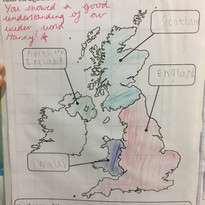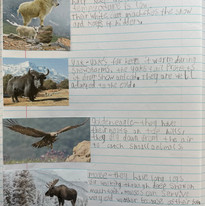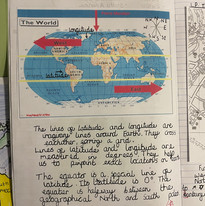
Intent
At the The Grange, we deliver the Geography National Curriculum by encouraging pupils to develop an appreciation and understanding of the world, initially building a secure physiological and social knowledge of the local community and subsequently developing and applying this to a wider range of regions, countries and continents of the world. Pupils will be taught to make links between these areas of learning, with the aim of developing engaged, motivated and curious learners that take an interest in the world around them.
Our geography curriculum has been designed to cover all of the skills, knowledge and understanding as set out in the National Curriculum. The National Curriculum states that ‘a high-quality geography education should inspire in pupils a curiosity and fascination about the world and its people that will remain with them for the rest of their lives.’
We implement a progressive geography curriculum within a two-year rolling program through our six whole school projects of Citizenship, Expression, Dynasties, Universe, Life and Dynamics. The content covered, stems from the National Curriculum, supported by the Cornerstones Curriculum resources to ensure that we bring the whole school together through our common thread.
To ensure that pupils develop a secure knowledge that they can build on, our Geography curriculum is organised into a progression model that outlines the skills, knowledge and vocabulary to be taught in a sequentially coherent way:
-
Locational Knowledge
-
Human and Physical Geography
-
Geographical Skills and Fieldwork
-
Map work
-
Communication
The key skills are mapped out to ensure that pupils build on secure prior knowledge from the previous year.
When covering each of these strands, the content will be carefully organised by each year group through a long-term plan. Content knowledge, vocabulary and skills will then be planned for at a greater level of detail in the medium-term plan. Geography is delivered through subject specific teaching organised into blocks under a theme. Meaningful links with other subjects are made to strengthen connections and understanding for pupils. We deliver a geography curriculum that focuses on developing a sense of place that is underpinned, not only by our learning and experiences in SMSC and PD, but a core knowledge of facts, locations and vocabulary.
What is Cultural Capital?
Cultural capital is the accumulation of knowledge, behaviours, and skills that a child can draw upon and which demonstrates their cultural awareness, knowledge and competence; it is one of the key ingredients a child will draw upon to be successful in society, their career and the world of work. The development of ‘cultural capital’ within our children is an integral part of our Geography curriculum.
Implementation
All learning will start with revisiting prior knowledge and making meaningful connections. Staff will model explicitly the subject-specific vocabulary, knowledge, and key skills relevant to the learning to allow them to integrate new knowledge into larger concepts. Teachers will use images and artefacts to enhance learning. Through the use of Digimaps, children will be engaged and inspired to be curious and fascinated about the world, with digital access to modern day and historic maps and detailed aerial imagery.
Our children will access their immediate environment to gather first-hand experience to enhance their learning and develop a deeper understanding of their local area and to be able to make accurate comparisons with contrasting locations. In our local area, we have a wonderfully diverse community, and we use this to learn about different places around the world, including workshops lead by our multi-cultural families. We share information about global events and explore different cultures world-wide within distinct Geography lessons and through whole school assemblies. Many of our children do not experience the world outside of their immediate locality. As a staff, we aim to share our own experiences and provide as much knowledge of the outside world as possible; children are made aware that there are many countries and places of interest to visit.
Classroom displays provide constant scaffolding for children. Subject specific vocabulary is displayed on displays along with key facts, questions, and model exemplars of the work being taught. Geography assessment is ongoing throughout the relevant cross-curricular themes to inform teachers with their planning for lesson activities and differentiation.
Our weekly Assemblies are based around key dates recognised and celebrated in the UK and around the wider world. The thought provoking and interactive assemblies which are relevant to the lives of our children, readily support the teaching and learning of Geography at The Grange. Children are encouraged to think beyond their own location developing characteristics such as curiosity, thoughtfulness, empathy, reflectiveness and resourcefulness.
Impact
At The Grange, children can record their learning in a variety of ways, which is recorded within their Geography books. Evidence of learning and progress is dependent on the lesson outcome; year group and the skills and knowledge being developed. This could be in the form of: photographs of practical activities, use of world maps and local maps to identify features and areas, use of digital mapping, extended writing, or evidence of fieldwork.
Our teachers use a range of tools to assess the knowledge and skills pupils have; their progress and development points. This includes: assessment for learning; challenge tasks; independent and group enquiry; end of unit questions and green pen questions. Marking and feedback in geography follows the schools marking and feedback policy and is used to monitor progress and impact. Throughout the course of the lesson the class teacher (and support staff were present) will move around the class, offering support/challenge.
Pupil voice is used to enable leaders to assess the impact of the Geography curriculum and whether children know and remember more. Pupil work demonstrates that Geography is taught at an age-appropriate standard across each year, with sufficient challenge and opportunities for pupils working at greater depth.
‘As the future generation responsible for our planet, we want our children to know the importance of looking after our world’

























